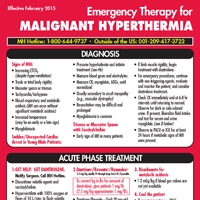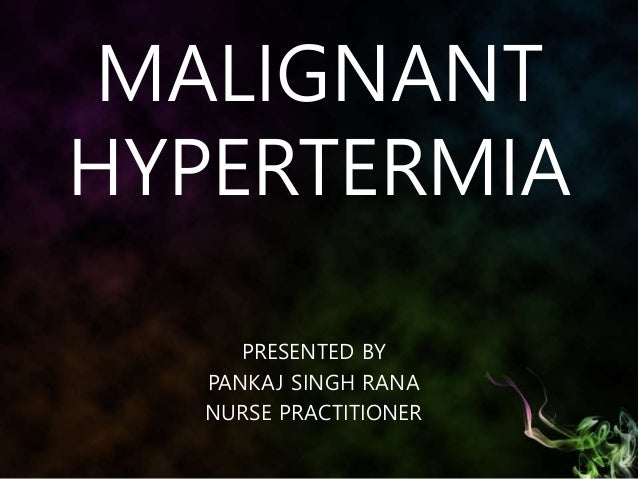Malignant Hyperthermia / Nyspana Does Mandatory Nursing Education On Malignant Hyperthermia Enhance Nursing Knowledge And Lead To Positive Patient Outcomes : Malignant hyperthermia is a severe reaction to certain drugs used for anesthesia.
Malignant Hyperthermia / Nyspana Does Mandatory Nursing Education On Malignant Hyperthermia Enhance Nursing Knowledge And Lead To Positive Patient Outcomes : Malignant hyperthermia is a severe reaction to certain drugs used for anesthesia.. Malignant hyperthermia is one of the most dreaded complications in general anesthesia. Malignant hyperthermia = pharmacogenetic disease of skeletal muscle induced by exposure to certain anaesthetic agents. Malignant hyperthermia (mh) is a potentially fatal. Malignant hyperthermia (mh) is a pharmacogenetic disorder of skeletal muscle that presents as a hypermetabolic response to potent volatile anesthetic gases such as halothane, sevoflurane. In the case of malignant hyperthermia, a ryanodine receptor defect leads to continuous muscle contraction.
Muldoon, md, maria voelkel, and john capacchione, md, uniformed services university of the health sciences, department of. Malignant hyperthermia (mh) is a type of severe reaction that occurs in response to particular medications used during general anesthesia. Malignant hyperthermia (mh) is a severe reaction to certain gases used during anesthesia and/or a muscle relaxant used to temporarily paralyze a person during surgery. Nord gratefully acknowledges sheila m. Abnormalities in the ryanodine receptor 1 gene are commonly detected in people who have experienced an episode of malignant hyperthermia.
Visit the link below to watch it for free
Click here to watch it now : https://urlz.fr/eXDh

Malignant hyperpyrexia, anesthesia related hyperthermia1. Malignant hyperthermia is a severe reaction to certain drugs used for anesthesia. Malignant hyperthermia (mh) is a severe reaction to certain gases used during anesthesia and/or a muscle relaxant used to temporarily paralyze a person during surgery. In the case of malignant hyperthermia, a ryanodine receptor defect leads to continuous muscle contraction. Malignant hyperthermia (mh) is a pharmacogenetic disorder of skeletal muscle that presents as a hypermetabolic response to potent volatile anesthetic gases such as halothane, sevoflurane. Malignant hyperthermia is a rare life threating condition. Abnormalities in the ryanodine receptor 1 gene are commonly detected in people who have experienced an episode of malignant hyperthermia. Malignant hyperthermia is a severe reaction to particular anesthetic drugs that are often used during surgery and other invasive procedures.
Malignant hyperpyrexia, anesthesia related hyperthermia1.
Malignant hyperthermia is a severe reaction to particular anesthetic drugs that are often used during surgery and other invasive procedures. Malignant hyperthermia occurs when a person undergoes an invasive medical procedure or surgery. Malignant hyperthermia is one of the most dreaded complications in general anesthesia. In the case of malignant hyperthermia, a ryanodine receptor defect leads to continuous muscle contraction. A report from the north american malignant hyperthermia registry of the malignant hyperthermia. The reaction is sometimes fatal. Abnormalities in the ryanodine receptor 1 gene are commonly detected in people who have experienced an episode of malignant hyperthermia. Malignant hyperthermia's inheritance is autosomal dominant with variable penetrance. Malignant hyperthermia is a severe reaction to certain drugs used for anesthesia. Malignant hyperthermia is a rare life threating condition. Malignant hyperthermia (mh) is a severe reaction to certain gases used during anesthesia and/or a muscle relaxant used to temporarily paralyze a person during surgery. This severe reaction typically includes a dangerously high body temperature, rigid muscles or spasms, a rapid heart rate. Malignant hyperpyrexia, malignant hyperthermia susceptibility, mhs, hyperthermia of anaesthesia, king syndrome.
Malignant hyperthermia (mh) is a pharmacogenetic disorder of skeletal muscle that presents as a hypermetabolic response to potent volatile anesthetic gases such as halothane, sevoflurane. Malignant hyperpyrexia, malignant hyperthermia susceptibility, mhs, hyperthermia of anaesthesia, king syndrome. Malignant hyperthermia (mh) is a condition that causes a number of physical changes to occur among genetically susceptible individuals when they are exposed to a particular muscle relaxant or certain. Malignant hyperthermia's inheritance is autosomal dominant with variable penetrance. Malignant hyperthermia occurs when a person undergoes an invasive medical procedure or surgery.
Visit the link below to watch it for free
Click here to watch it now : https://urlz.fr/eXDh

A report from the north american malignant hyperthermia registry of the malignant hyperthermia. Malignant hyperthermia (mh) is a pharmacogenetic disorder of skeletal muscle that presents as a hypermetabolic response to potent volatile anesthetic gases such as halothane, sevoflurane. It is caused by a rare, inherited muscle abnormality.… Malignant hyperthermia (mh) is a rare, inherited musculoskeletal syndrome that presents as a hypermetabolic reaction triggered by exposure to volatile anesthetic gases (e.g., desflurane, enflurane. Malignant hyperthermia = pharmacogenetic disease of skeletal muscle induced by exposure to certain anaesthetic agents. Malignant hyperthermia occurs when a person undergoes an invasive medical procedure or surgery. Malignant hyperthermia's inheritance is autosomal dominant with variable penetrance. Malignant hyperthermia (mh) is a condition that causes a number of physical changes to occur among genetically susceptible individuals when they are exposed to a particular muscle relaxant or certain.
Malignant hyperthermia (mh) is a pharmacogenetic disorder of skeletal muscle that presents as a hypermetabolic response to potent volatile anesthetic gases such as halothane, sevoflurane.
Malignant hyperpyrexia, anesthesia related hyperthermia1. It is caused by a rare, inherited muscle abnormality.… Malignant hyperthermia (mh) is a rare, inherited musculoskeletal syndrome that presents as a hypermetabolic reaction triggered by exposure to volatile anesthetic gases (e.g., desflurane, enflurane. A report from the north american malignant hyperthermia registry of the malignant hyperthermia. Malignant hyperthermia is a severe reaction to certain drugs used for anesthesia. In the case of malignant hyperthermia, a ryanodine receptor defect leads to continuous muscle contraction. Nord gratefully acknowledges sheila m. Explore symptoms, inheritance, genetics of this condition. Malignant hyperthermia (mh) is a type of severe reaction that occurs in response to particular medications used during general anesthesia. Assessment | biopsychology | comparative | cognitive | developmental | language | individual differences | personality | philosophy | social | methods | statistics | clinical | educational | industrial | professional items | world psychology |. Malignant hyperthermia is a rare life threating condition. Malignant hyperthermia occurs when a person undergoes an invasive medical procedure or surgery. Malignant hyperthermia's inheritance is autosomal dominant with variable penetrance.
Malignant hyperthermia is a severe reaction to a dose of anesthetics. The reaction is sometimes fatal. Malignant hyperthermia (mh) is a potentially fatal. Abnormalities in the ryanodine receptor 1 gene are commonly detected in people who have experienced an episode of malignant hyperthermia. It is caused by a rare, inherited muscle abnormality.…
Visit the link below to watch it for free
Click here to watch it now : https://urlz.fr/eXDh

Nord gratefully acknowledges sheila m. Malignant hyperthermia is a severe reaction to particular anesthetic drugs that are often used during surgery and other invasive procedures. Malignant hyperthermia (mh) is a potentially fatal. This severe reaction typically includes a dangerously high body temperature, rigid muscles or spasms, a rapid heart rate. Malignant hyperthermia (mh) is a pharmacogenetic disorder of skeletal muscle that presents as a hypermetabolic response to potent volatile anesthetic gases such as halothane, sevoflurane. Malignant hyperthermia (mh) is a condition that causes a number of physical changes to occur among genetically susceptible individuals when they are exposed to a particular muscle relaxant or certain. Malignant hyperthermia is a severe reaction to a dose of anesthetics. In the case of malignant hyperthermia, a ryanodine receptor defect leads to continuous muscle contraction.
Malignant hyperthermia (mh) is a severe reaction to certain gases used during anesthesia and/or a muscle relaxant used to temporarily paralyze a person during surgery.
Nord gratefully acknowledges sheila m. Malignant hyperpyrexia, anesthesia related hyperthermia1. It is triggered in susceptible individuals primarily by the volatile inhalational anesthetic. Malignant hyperthermia = pharmacogenetic disease of skeletal muscle induced by exposure to certain anaesthetic agents. Malignant hyperthermia (mh) is a severe reaction to certain gases used during anesthesia and/or a muscle relaxant used to temporarily paralyze a person during surgery. Malignant hyperthermia is a severe reaction to particular anesthetic drugs that are often used during surgery and other invasive procedures. Malignant hyperthermia is a rare life threating condition. Malignant hyperthermia is one of the most dreaded complications in general anesthesia. Malignant hyperthermia (mh) is a condition that causes a number of physical changes to occur among genetically susceptible individuals when they are exposed to a particular muscle relaxant or certain. Malignant hyperthermia (mh) is a rare, inherited musculoskeletal syndrome that presents as a hypermetabolic reaction triggered by exposure to volatile anesthetic gases (e.g., desflurane, enflurane. A report from the north american malignant hyperthermia registry of the malignant hyperthermia. Malignant hyperthermia (mh) is a pharmacogenetic disorder of skeletal muscle that presents as a hypermetabolic response to potent volatile anesthetic gases such as halothane, sevoflurane. Malignant hyperthermia is a severe reaction to certain drugs used for anesthesia.
It is caused by a rare, inherited muscle abnormality… malignant. It is triggered in susceptible individuals primarily by the volatile inhalational anesthetic.
Komentar
Posting Komentar